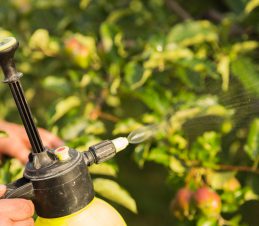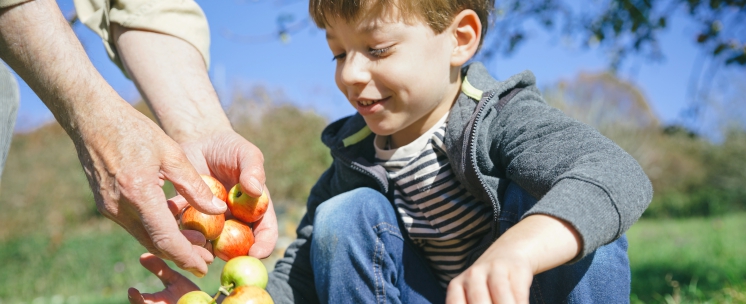While one goal of the SIR Program is to reduce the need for chemical pesticides, some chemical intervention may be required to manage the codling moth on your residential property.
Domestic Pesticides
Many domestic pesticides have been withdrawn from the market, or will be withdrawn within the next several years. Commercial pest control companies with licensed pesticide applicators have access to newer and more effective agricultural pest control products that are not available to the home gardener. Consider having your fruit trees professionally treated.
Insecticides available to the home gardener for codling moth include permethrin and carbaryl. Btk does not provide sufficient control.
Always read the pesticide label or proper application rates, mixing instructions, safety precautions, and minimum waiting period before harvesting. Avoid contact with the treated plants for at least two days after spraying.
-
Timing
Once the codling moth larva is inside an apple it is shielded from the toxic effects of most pesticides, therefore pesticides must be applied before the eggs hatch.
Whether you apply the spray yourself or hire a professional pesticide applicator, spraying should start about 17 to 21 days after full bloom (about 10 days after most of the flower petals drop from the tree) to target the newly hatched larvae before they bore into the fruit.
If you miss this window, you can spray once you observe the first codling moth sting.
Several insecticide applications will be required to protect the fruit over the summer.
-
Spray Success
 Many factors impact the success of a spray program, including: the product used, spray residual (the length of time it takes for the spray to breakdown), timing, spray coverage, weather, irrigation, and the level of codling moth pressure.
Many factors impact the success of a spray program, including: the product used, spray residual (the length of time it takes for the spray to breakdown), timing, spray coverage, weather, irrigation, and the level of codling moth pressure.Be aware that spraying alone will not control codling moth infestation. It is important to properly prune your trees, thin the fruit clusters, and remove and destroy all infested fruit throughout the entire growing season.
The BC Ministry of Agriculture provides more information on managing backyard fruit trees, including the use of domestic pesticides.
Avoid planning vegetables or herb gardens, or creating a play area beneath the trees to avoid contamination by the sprays.

